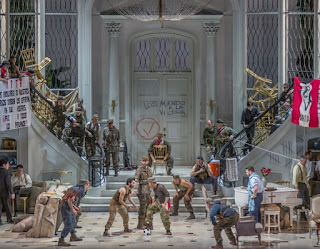 |
| Set image from lyricopera.org |
In the novel, a world-famous soprano is hired to sing at a birthday party for a Japanese industrialist, held in an unnamed South American country. When the party is taken over by terrorists, the partygoers are held hostage in the home of the country's vice president. It's a perfectly gorgeous novel, and one I've read over and over again. As an opera fan, I think so often of this quote:
"All of the orchestra supports her now, it reaches with the voices, lifts the voices up, the beautiful voice of Roxane Coss is singing her Gilda to the young Katsumi Hosokawa. Her voice vibrating the tiny bones deep inside her ear. Her voice stays inside him, becomes him. She is singing her part to him, and to a thousand other people. He is anonymous, equal, loved."
 |
| Photo by Andrew Cioffi |
And hurrah for new opera! Hurrah for opera companies taking a chance and commissioning new work. Hurrah for composer Jimmy Lopez and librettist Nilo Cruz, both of whom bring their rich culture (Peruvian and Cuban-American respectively) to this traditionally white, European art form. And hurrah for an opera with absolutely marvelous racially diverse characters and performers.
 |
Nilo Cruz and Jimmy Lopez,
Sir Andrew Davis and Kevin Newbury.
Photo: Todd Rosenberg
|
And here's the other thing: In the book, the music transcended language. In fact, the primary character emerged to be Gen, the Japanese industrialist's translator. With opera, it can be difficult to distinguish between the languages--especially as they're all subtitled in English. When I heard that Andrew Stenson sang in eight languages, I was astonished. It's hard to really see the singing crossing barriers when a) everyone sings, and b) you can't distinguish languages.
I also feel like there were too many people moving around the stage, and we weren't able to distinguish the characters--the relationships would be hard to determine if you hadn't read the book. And I adore this book, so it's particularly hard to let go of those strong characters. They also took away the unnamed aspect of it and made it more specific to the original incident that inspired the book, which took place in Peru, which took away some of the mystery of the book.
I can actually see Bel Canto more as a play with music. You can still play with language, and bring in the amazing arias, but keeping it less musical would make it more powerful. And I'll say it: I adore this book.
That said, YAY NEW OPERA. I look very much forward to more work by Jimmy Lopez, and more operatic work by Nilo Cruz. And I look forward to seeing what shape this opera takes as other opera companies take it on. I feel extraordinarily lucky to have seen it at the beautiful Lyric Opera House.
Want to know more about this opera? Check out Lyric Opera's handy Online Opera Guide. There's also tons of information on their website including sneak peeks at the music, behind the scenes videos, and book discussion guides.
Sidebar on Lyric Opera of Chicago: This is a fabulous place to see an opera. Gorgeous house and dining room, ample lobby space for mingling and enjoying cocktails, and having seen shows from the second tier and the front row, I can say both are wonderful. And the staff! From box office, to bar, to elevator operator to ushers, they are amazingly friendly and helpful and provide world-class customer service. Also, if you get the chance, take their backstage tour. It's worth it just to see the costume department (oh, those gorgeous Der Rosenkavalier costumes!) up close.
